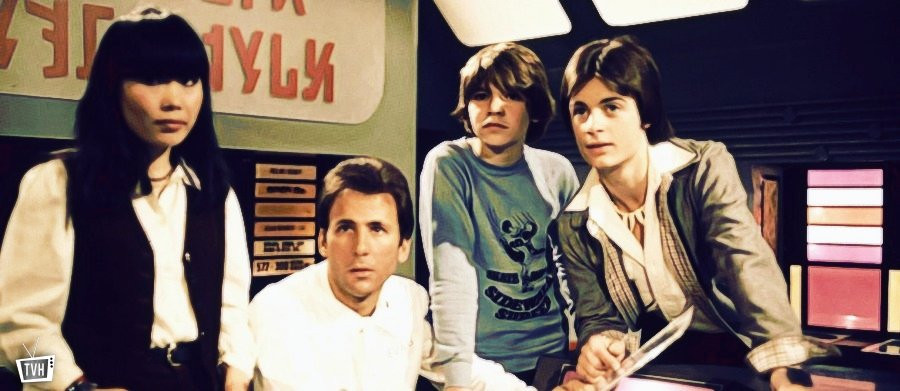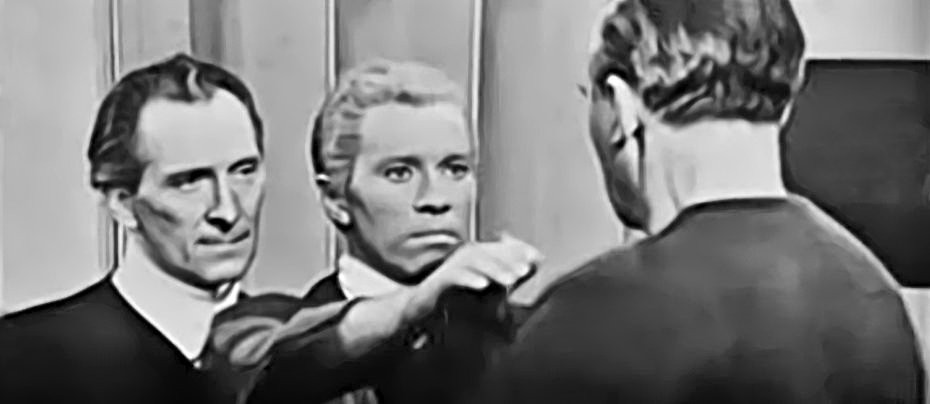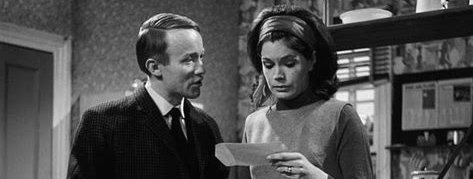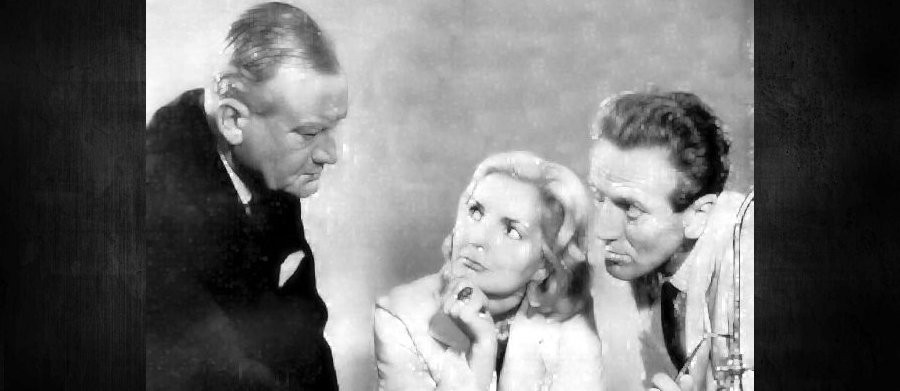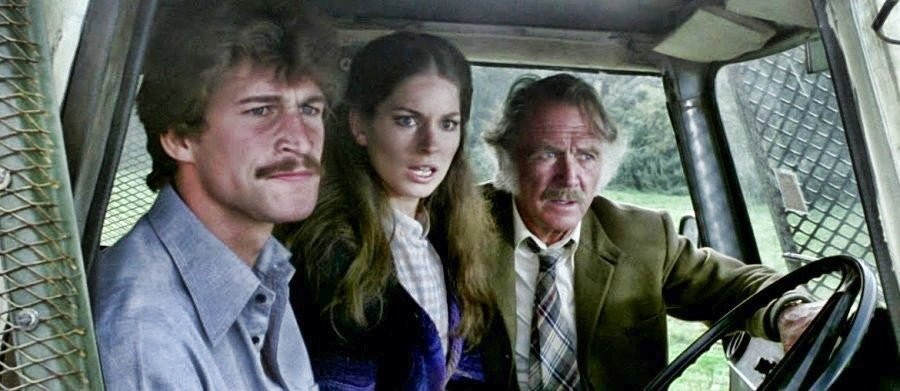
Quatermass IV
Review – Daniel Tessier
Twenty-one years after his last television appearance and twelve years after his last film, Professor Bernard Quatermass returned to the screen. This was to be a very different Quatermass, though. It wasn't the fifties anymore; the world of 1979 was a harsher, more cynical place, and Nigel Kneale was perhaps a harsher, more cynical man.
Early plans for a fourth Quatermass serial date back to the 1960s, when Irene Shubik approached Kneale to write a script featuring the character for the sci-fi anthology series Out of the Unknown. These came to nought, but Kneale's work for Hammer Films and their successful 1967 film adaptation of the third serial ( Quatermass and the Pit , or Five Million Years to Earth ) led to that studio enquiring about an original Quatermass film. This also failed to move beyond initial negotiations, and Kneale was tempted back to work for the BBC on other projects. In the early seventies, the BBC began seriously working on a fourth serial, with Kneale providing an ambitious script. Spiralling costs led to this project being shelved. By 1975, Kneale's deteriorating relationship with the BBC led to his taking the script to his new employers, ITV.
The four-part serial is simply titled Quatermass. To distinguish it from the previous serials – The Quatermass Experiment(1953), Quatermass II (1955) and Quatermass and the Pit (1958) – and their film adaptations, fans often refer to it as Quatermass IV, or by the title of its film adaptation, The Quatermass Conclusion. The serial was overseen by executive producer Verity Lambert, best known for her part in creating Doctor Who and who had since become a major player in British television. Ted Childs – later Controller of Drama for Central Independent Television, latterly Carlton Central – acted as producer, while Piers Haggard – a prolific film and television director, best known for Pennies From Heaven –directed the serial. In a canny move, ITV commissioned Kneale to adapt his own scripts for a cinematic version, to be reworked largely from the television footage, which was reserved for international theatrical release.

No two serials feature the same actor as Quatermass, and for the seventies, Sir John Mills, a well-established stage and film actor took the role. This is an older, tired Professor Quatermass, now living in retreat (some might say hiding) in the Scottish Highlands, tempted down to London for a television appearance. This is merely an excuse for him to go to the capital to look for his missing granddaughter Hettie (the daughter of his own daughter Paula, who appeared in Quatermass II, but since killed in a road accident).

He finds London in a state of chaos, a dystopian near future where urban society has decayed to near barbarism. As soon as he arrives, he's set upon by a bunch of (terribly well-spoken) thugs, narrowly rescued by astronomer Joe Kapp (Simon MacCorkindale, I, Claudius) who is appearing on the same programme. The programme involves live data from a joint American-Soviet space mission, but the two spacecraft are utterly destroyed by an unknown force. Kapp invites Quatermass to his country home, where he and several like-minded individuals have taken control of two radio telescopes. Quatermass is intrigued by the behaviour of a group of Planet People, a hippie-like counter-culture who shun science and technology. The Planet People have been making pilgrimages to neolithic sites, where they believe alien beings will uplift them to a new life on another planet, and the Professor believes his granddaughter may have joined them.
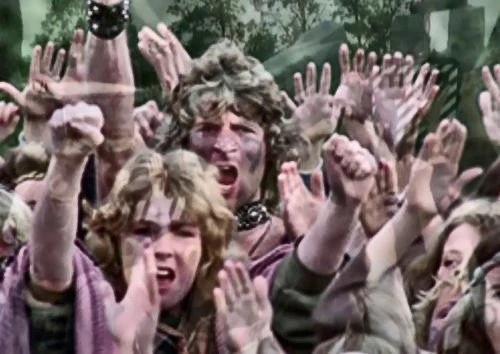
The Planet People convene at Ringstone Round – a neolithic stone circle, memorialised in a very creepy nursery rhyme – and vanish in a blinding flash of light. Those that remain believe their fellows have been transported to "the planet," but it's clear to Quatermass and Kapp that they've been incinerated – sparkly ash and dust is all that's left of them. They find one badly injured survivor – a young girl played by Annabelle Lanyon – who was halfway in the field of capture. She's been left delirious, and is cared for by Kapp's wife (the excellent Barbara Kellerman). It becomes clear that similar incidents have occurred across the world, with thousands of young people vanishing at large scale structures.
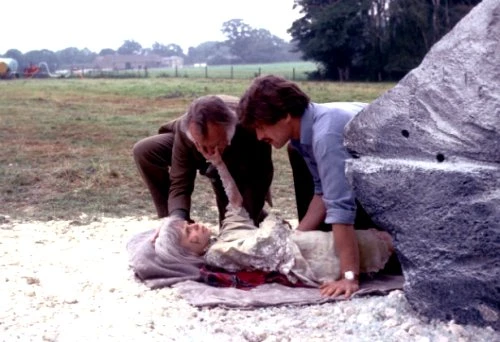
There are themes at play that continue from the earlier serials. Kneale's disillusionment with humanity became clear in Quatermass and the Pit , where he supposed that human beings were innately corrupt due to alien influence in our genetic past. Here, though, his misanthropy has gotten the better of him. Kneale was only fifty-seven when this came out, but he was already coming across as an angry old man. Kneale spoke in interviews promoting the serial: "Quatermass is a story of the future – but perhaps only a few years from now. There are some clues already in the most obvious places: the streets. Pavements littered with rubbish. Walls painted with angry graffiti. Belfast black with smoke and rage. Worst of all, the mindless violence." He went on to complain about "teenage delinquents... flower power and hippies..." It's very much the outburst of someone feeling left behind by young society. Quatermass showed a Britain of the then-near future that had collapsed into chaos and violence, and it was all young people's fault.
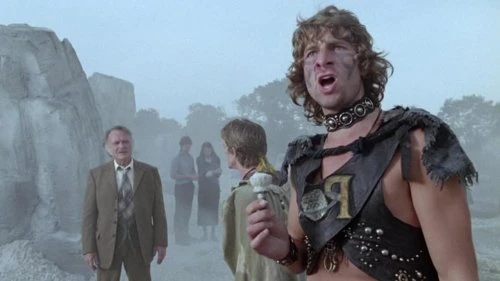
While attacking hippies and punks must have appeared dated even in 1979, there are some elements that resonate today. Protesters are met with extreme violence by police; people distrust scientists and have fallen back on superstitious beliefs; groups of different political stance are incapable of finding any common ground. There are certainly parts of that common to the world today. One theme common to all the Quatermass serials is the smallness of humanity. As usual, we never truly understand the threat faced here, going on the Professor's best hypotheses. The alien force seems unintelligent, an automated system sent to harvest human life periodically, for reasons unknown, although Quatermass theorises we could be food or another biological resource. We're nothing but animals in the eyes of the powerful intelligences and forces that exist beyond the Earth.

The serial, in spite of being only four episodes long, drags much more than any of the fifties stories. Each episode is nearly an hour long, and Kneale hadn't improved his pacing to match the style of television of the seventies. The cinematic cut improves upon this, being a mere hundred minutes long, but cutting the story down to a quarter of its length makes it much harder to follow. In fact, the best version of the story is probably Kneale's own novelisation, which allows him the room to explore his ideas. Haggard's direction is fine, with the entire production having a gritty realism (aside from the incessant poshness of almost all the actors) that is helped by some excellent production values. The planned climactic alien event at Stonehenge was scuppered due to cost and the near-impossibility of gaining permission to film there, but the replacement venue of Wembley Stadium is suitably impressive.

On the whole, Quatermass is a poor shadow of its fifties forebears. It's slow, angry and frankly rather depressing, without bringing enough new to the table to offset its old-fashioned style. While Mills in particular gives an excellent performance and the cast all perform with conviction, they can't save the story from outstaying its welcome. The serial presented a very final conclusion to the Quatermass story, but it still had a legacy. While Kneale had no intention to return to the character for some years, he eventually came up with a prequel idea, provisonally titled "Quatermass and the Third Reich," but was turned down upon presenting this to the BBC. The only new material for the Professor would be a strand in the 1996 radio serial "The Quatermass Memoirs," a mix of documentary and fiction that starred Andrew Keir, reprising his role from the 1967 film. The final appearance of the Professor was in 2005, when the BBC put on a live remake of The Quatermass Experiment, with Jason Flemyng in the title role. Since Kneale's death in 2006, the notoriously complex rights to the character have made any further outings for Quatermass seemingly impossible.
Daniel Tessier
Dan describes himself as a geek. Skinny white guy. Older than he looks. Younger than he feels. Reads, watches, plays and writes. Has been compared to the third, fourth, fifth, sixth, seventh, eighth, tenth, eleventh and twelfth Doctors, and the Dream Lord. Plus Dr. Smith from 'Lost in Space.' He has also had a short story published in Master Pieces: Misadventures in Space and Time a charity anthology about the renegade Time Lord.
Dan's web page can be here: Immaterial
Published on September 7th, 2020. Written by Daniel Tessier for Television Heaven.


